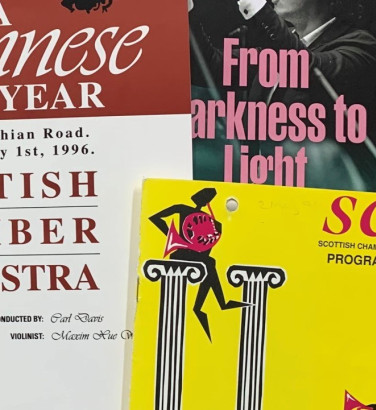
Napoleon and the Eroica
28 Aug 2023
News Story
The Coronation of Napoleon by Jacques-Louis David (detail)
One of the best-known chapters in the Beethoven mythology is how his admiration for Napoleon Bonaparte turned sour when the latter declared himself Emperor in May 1804. The composer had completed a symphony entitled Bonaparte earlier that spring, only for it to be renamed Sinfonia Eroica on its publication two years later.
In what reads rather like a rant, Beethoven reacted to the news that Napoleon had (in his eyes) utterly betrayed the principles of the French Revolution by complaining that “he will tread under foot all the Rights of Man, indulge only his ambition, […] think himself superior to all men, become a tyrant!” Later that same year, however, he insisted that “the title of the symphony really is Bonaparte”, suggesting that even after his self-appointed elevation, the work still had something to say about the Corsican general. Eroica (Italian for ‘heroic’) may be a very apt title for the music, but the original one cannot be entirely without significance.

The title page of the Eroica (with the word Bonaparte visibly scratched out)
The designation of the second movement as a funeral march alone shows that Beethoven’s view of heroism (whether Napoleon’s or anyone else’s) is not limited to hollow triumphalism. The brutality of the first movement – peppered with insistent rhythms against the established pulse, culminating in some truly alarming discords – has suggested to some that it represents a battle, with the second depicting the desolation of its aftermath. If this music comments on the horrors of war as part of the Eroica, within the context of the Bonaparte it seems more concerned with the human cost of struggling against a brutal regime.
The third movement, by contrast, is all excited chatter, as though the previously oppressed masses finally have something to look forward to. The metaphor can be extended into the finale, in which Beethoven explores the manifold possibilities through an elaborate set of variations on his chosen theme: a belief in something better, he seems to imply, can be as infectious as the potential for heroics. (If the egotism some have identified in Richard Strauss’ Ein Heldenleben would have horrified Beethoven, it seems likely he would have embraced David Bowie’s Heroes wholeheartedly.)
If the Eroica does say anything about Napoleon the Emperor, this may well be hinted at on Beethoven’s amended title page, according to which the symphony was ‘composed to celebrate the memory of a great man’. It’s tempting to conclude that this exalted figure is imaginary, but the inclusion of that word ‘memory’ carries with it the implication that the person in question has died. Given that Napoleon had sunk so low in Beethoven’s estimation, perhaps we should interpret the symphony’s dedication figuratively and mourn not so much the man as a squandered potential for greatness.
Related Stories
![]()
Andrew Manze: "I've always loved Viennese waltzes and polkas"
1 December 2025
Our Principal Guest Conductor is really looking forward to conducting our Viennese New Year concerts!![]()
The medieval carol
24 November 2025
For this year's Christmas article, we look back at some very early festive carols ...![]()
A history of the orchestral concert
17 November 2025
Is there such a thing as a standard concert format? Join us as we dive into the history of programming ...


